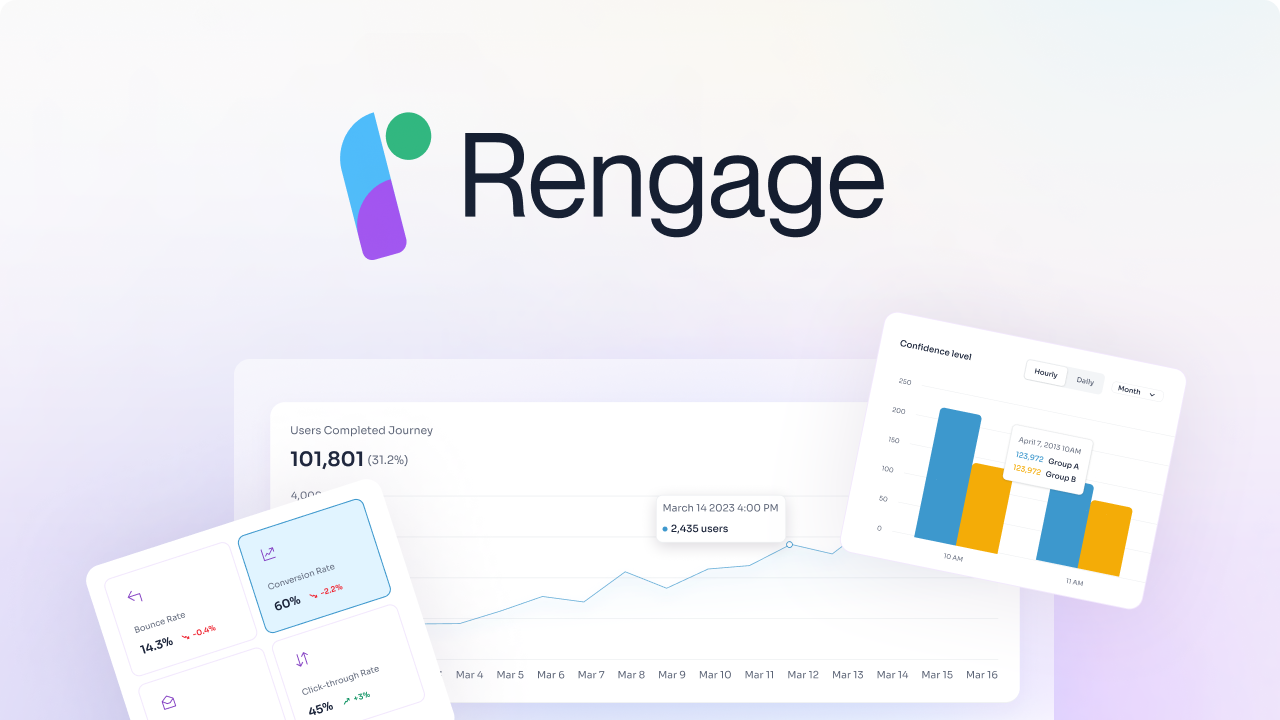Are you struggling to efficiently analyze your customer data to enhance your customer segmentation strategies? Understanding your customers' behavior and preferences is crucial for tailoring your marketing campaigns and improving the overall customer experience. This blog on customer data platform tools will help you navigate the complexities of customer segmentation analysis to enhance your segmentation strategies and boost customer engagement.
What Is a Customer Data Platform (CDP)?

A customer data platform (CDP) is software that businesses use to organize and manage all of the information they collect about their customers in one place. In essence, they’re data management platforms that collect, sort, and standardize huge amounts of information automatically—on a scale that humans can’t.
A Digital Vault for User Information
Think of it like an enormous digital filing cabinet or a Raiders of the Lost Ark-style warehouse for all of your customers’ information. This often includes things like their contact information, what products they’ve purchased, and how they interact with your website – down to the minutiae of which pages they look at, for how long, and what they do next.
Making Smarter Decisions with Unified Data
The core idea behind a customer data platform is that having all of this information in one spot makes it easier for businesses to better understand their customers and make smarter decisions about how to market and sell to them.
Your Customer Data Virtual Assistant
In other words, a customer data platform is like having a virtual assistant who knows everything about your customers and can help you target them better with messaging, activations, and campaigns.
What does a CDP do?
A customer data platform (CDP) is like a vacuum that can suck up all of the relevant behavioral customer data points that can help businesses communicate with them. They then take this data and standardize it into a format that’s accessible by other tools, such as customer relationship management (CRMs) and customer experience management (CEM) tools.
That integration between raw data and the tools that utilize it gives businesses a more complete understanding of their customers and helps marketers create more personalized experiences for them.
Specifically, this kind of data management platform can help you with:
Collecting and centralizing customer data from various sources
A CDP makes it easy to gather customer data from all over and keep it all in one spot, so you can have a complete picture of your customers, including their demographic, purchase history, transactional, and behavioral data.
Customer profiles, segments, and personalization
A CDP can take all of that rich, ever-evolving information and use it to build personas and profiles for each customer or customer type. It can then divide those profiles into different groups or segments based on things like age, location, or purchase history so you can target your marketing efforts more effectively. Because of how personal it is to each customer, that should make your marketing more impactful and meaningful.
Integration with other marketing and sales tools
Customer data platforms are designed to integrate seamlessly with the business tools you’re already using – like email marketing platforms or customer relationship management systems – to make reaching your customers much easier. That also includes the ability to automate and streamline a lot of your marketing campaigns and processes.
Adhering to data compliance
Customer data is delicate and can lead to regulatory issues if handled erroneously. Any customer data platform worth its salt should fully comply with today’s international data privacy legislation. This means you’ll keep your customer data safe and within the legal remit of regulations like GDPR and CCPA.
Top 9 Benefits of a Customer Data Platform

1. Create unified customer profiles
CDPs don’t just collect and store data; they process it into customer profiles that can be used to create single customer views (SCVs). Also called 360-customer views, SCVs are profiles created by a CDP from all the data gathered on a single customer. They provide marketers with a unified view of insights like their behaviors, information, purchase history, and interests.
2. Eliminate data silos
When different teams or departments each keep track of different sources of customer data, it creates data silos. A CDP gathers all customer data into one place, even if data is streaming in from various sources. That way, a company can access all their online and offline data from every touchpoint all at once and create informed decisions on what experiences will resonate with their customers best.
3. Improve personalization
Customers expect digital experiences to be personal. Having a unified view of each customer helps brands identify which experiences will be most relevant and personal. This includes understanding what your customers want to hear and when and through which touchpoints they are most likely to interact with your brand — even as their preferences change.
4. Increase data privacy and compliance
CDPs help brands keep customer data secure and in compliance with regulations by combining data sources, creating complete and up-to-date profiles, and quickly accessing those profiles.
5. Increase revenue
Personalization can lift revenues by 5–15% and increase the efficiency of marketing spend by 10–30%. Using SCVs to create more personalized experiences, companies can increase customer engagement and brand loyalty, resulting in higher conversion rates and revenue.
6. Improve omnichannel customer experiences
CDPs use actionable customer insights to activate experiences across relevant mobile, web, email, and social media channels. Because these experiences are informed by a unified profile, CDPs can adapt and curate a personalized, consistent journey — even as a customer’s needs and behaviors evolve.
7. Increase efficiency
CDPs reduce data gaps between departments and avoid the redundancy that occurs with data silos. By constantly updating data from various sources, CDPs instead have the most up-to-date insights on the kinds of experiences that will resonate with your customers. Using AI and automation, CDPs then use these profiles to create experiences informed by when, where, and how a customer likes to engage — and then deliver just the right experiences.
8. Improve customer experience
By turning unified data into SCVs, you can better serve your customers by creating personalized content that meets their needs. This shows that you value your customers while differentiating your brand to increase retention, loyalty, and, ultimately customer lifetime value (CLV).
9. Use a single platform for B2C and B2B businesses
B2B and B2C marketers can benefit from a CDP’s comprehensive understanding of customers. Instead of requiring manual workflows, advanced skills, and IT support, real-time CDPs empower marketers to create profiles made up of consumers, professionals, or both — enabling teams to work closer together to personalize experiences for any audience.
Streamlining Customer Journeys: Activation, Conversion, and Beyond
We provide a comprehensive solution for managing and enhancing customer journeys, delivering insights and measurable outcomes with no code. We accelerate your customer journey from onboarding, activation to conversion and churn. Enabling customers to unlock revenue from their existing user.
With Rengage, you can get insights into your segments, run campaigns with an intuitive journey manager, and get insights to measure how your journeys impact users conversion through our Journey Moments and Journey Builder features.
- Journey Moments: insights into your micro-segments
- Journey Builder: intuitive multi-channel marketing automation
- Insights prediction and attribution.
Book a free demo to learn about how you can transform customer interactions into personalized experiences that drive loyalty and growth.
Related Reading
- Customer Data Infrastructure
- Omnichannel Analytics
- Customer Data Integration
- Predicting Customer Behavior
- Marketing Data Platform
- Customer Data Platform Vs Data Management Platform
- Customer Data Platform Use Cases
- Best Customer Data Platform
- Customer Data Platform Capabilities
- How To Choose Cdp
4 Types of Customer Data Platforms

1. Marketing Clouds
Marketing Clouds provide a range of cloud-based marketing tools that can be utilized for various marketing activities. They are highly versatile, can be used for marketing campaigns, and are ideal for managing data. With the availability of diverse tools, marketers and advertisers can use marketing clouds to target leads with a personalized approach. Marketing Clouds are also known for their data storage capabilities and tracking. The data recorded by these tools can be used to evaluate a campaign's overall performance.
2. Smart Hubs
Smart Hubs are a central hub for a company's marketing technology or martech. They work as a collection of tools to enhance the company's marketing and advertising campaigns. Marketers use smart hubs to segment data and focus on a specific group of customers. Marketing teams can also use smart hubs to analyze the data, create custom marketing campaigns, ensure data accuracy, and create visual reports. Smart Hubs stand out because they provide custom analytics tools for reports and can be used for data automation.
3. Marketing Data Integration
Marketing Data Integration CDPs place data first, with API capabilities. They are designed to provide companies with a robust platform that includes features for integrating data from different sources. These tools are ideal for companies looking to streamline their data processes and simplify customer data management. Marketing Data Integration CDPs are known for their compatibility with other CRM tools and ease of data analysis use.
4. Engines and Toolkit
Engines and Toolkit CDPs are platforms businesses build if the available CDPs are deemed insufficient or to answer specific needs. They are customizable and ideal for companies that need a solution tailored to their specific requirements. With their flexibility in features and customization options, Engines and Toolkit CDPs stand out for their ability to meet unique business needs. These platforms can be tailored to match a company's branding and data management requirements.
Related Reading
- Customer Retention Automation
- Customer Data Integration Best Practices
- Real Time Customer Segmentation
- Chat CDP
- Customer Data Platform Implementation
- Benefits Of A Customer Data Platform
- Customer Segmentation Solutions
- Omnichannel Measurement
- AI Customer Segmentation
- AI CDP
- Customer Data Platform GDPR
- Customer Data Platform Costs
- CDP Personalization
31 Customer Data Platform Tools to Consider
1. Rengage

We provide a comprehensive solution for managing and enhancing customer journeys, delivering insights and measurable outcomes with no code. We accelerate your customer journey from onboarding, activation to conversion and churn. Enabling customers to unlock revenue from their existing user.
With Rengage, you can get insights into your segments, run campaigns with an intuitive journey manager, and get insights to measure how your journeys impact users conversion through our Journey Moments and Journey Builder features.
- Journey Moments: insights into your micro-segments
- Journey Builder: intuitive multi-channel marketing automation
- Insights prediction and attribution.
Book a free demo to learn about how you can transform customer interactions into personalized experiences that drive loyalty and growth.
2. Segment
Segment is a customer data platform by Twilio that enables users to collect and route their customer data to various integrated systems. It is favoured because of its easy setup, real-time tracking, and modifiable dashboards. This customer data platform gives you the power to send data to multiple destinations. It also includes some really cool features, such as cross-channel engagement design (journeys), a way of customising your data pipeline (functions), and a simplified way of transforming and loading customer data (warehouses).
3. Bloomreach Engagement
Bloomreach is a commerce experience cloud that acquired Exponea this year and incorporated its customer data platform capabilities into its product kit. The Bloomreach CDP, called Bloomreach Engagement, offers online and offline data tracking, a unified single customer view, and advanced customer data analytics. It also has some great machine learning aspects and predictive recommendations, which make it really intuitive.
4. Totango
Totango’s DNA-CX (Dynamic No-Schema Active Customer Index technology) is an intelligent customer data platform that lets users connect all customer data streams. This software is great for being able to segment your customers and see different metrics which help you identify which among your customers you need to prioritise.
5. Blueshift
The Blueshift Smarthub Customer Data Platform is another great option if you’re looking for a CDP that will deliver real-time experiences throughout the entire (omnichannel) journey. It’s extensive AppHub also provides users with a wide variety of data integrations, which is certainly a plus! Fan favorites on this platform include real-time data unification, audience segmentation, 1:1 personalization and predictive intelligence.
6. Insider
Ranked among the world’s top 5 marketing platforms on the Forrester Wave for Cross-Channel Campaign Management, Insider is certainly a top-rated customer data platform. The platform enables marketers to connect their data across various channels, predict future behaviour with its AI intent engine, and create individualised customer experiences.
7. Tealium AudienceStream CDP
Tealium AudienceStream Customer Data Platform is a great customer data platform if you’re looking to bring together fragmented chunks of data from all kinds of data sources and bring it together. Leverage various business rules and enrich your data as it flows in. Unique features of AudienceStream (the platform built into Tealium) include identity resolution, data enrichment and cross-channel audience management. The platform offers over 1300+ turnkey integrations, allowing users to connect their systems and data effortlessly.
8. Listrak
As a cross-channel marketing platform, Listrak offers various ‘components’ including unified customer data. It’s a great platform for those seeking versatility and top-notch automation capabilities. Users are particularly happy with the data visualization capabilities, AI recommendations and predictive analytics features. Keep in mind that this platform requires a bit more onboarding due to its steep learning curve.
9. Lytics
Lytics is ideal for digital marketers looking to build personalized digital experiences quickly and easily using an affordable platform. According to G2, Lytics’ ability to identify and target specific users within a segment has proven instrumental in the way many organizations conduct business. Depending on how large your data segments are, the platform can be a bit on the slower side.
10. Treasure Data
Treasure Data is a well-known customer data platform that enables its users to unify all kinds of data, including marketing hubs, IoT, weblogs, and geolocation data. This CDP offers 150 out-of-the-box connectors, so you can bring this data together easily and in real time. It’s also got a great up-to-the-minute real-time data analysis feature so that users always know what’s going on their digital channels.
11. BlueVenn by Upland Software
BlueVenn, recently acquired by Upland Software, is a customer data platform and omnichannel marketing hub. What’s great about this platform is that it offers easy-to-use data loaders and an intuitive user interface that requires little to no support from IT. This browser-based solution also includes drag-and-drop analytics, predictive insights and segmentation tools.
12. SAP Customer Data Platform
Just over a year ago, SAP launched its own Customer Data platform. This new technology focuses on four main priorities: connecting data from multiple sources, purpose-driven data governance, processing large volumes of data, and hyper-personalising using a 360-degree customer view. It also offers a back office system connection and real-time insight activation.
13. Microsoft Dynamics 365 Customer Insights
Microsoft Dynamics 365 Customer Insights is — you guessed it! — a part of Microsoft’s customer data platform (CDP) that helps deliver personalized customer experiences. The solution is divided into Audience insights and Engagement insights. Audience insights focus on connecting data from transactional, behavioral, and observational sources for a 360-degree view. In contrast, Engagement insights enable users to understand how customers are behaving on the various channels.
14. Oracle Unity
Oracle Unity is an attractive CDP for both B2C and B2B brands which aggregates traditional marketing and advertising data, including online, offline, and third-party customer data sources. Looking to connect individuals across devices, channels, domains, and networks and create accessible profiles, using advanced privacy and identity controls? Then this might be the CDP for you.
15. Salesforce Interaction Studio
This tool is particularly useful for streamlining offline and online customer interactions. It leverages AI technologies to segment customer data and helps users personalize interactions based on existing portfolios and the customer’s previous behavior. What’s more — this data is all gathered in real-time from every digital touchpoint including web, mobile, retail, advertising and phone.
16. RedPoint Global
RedPoint Global is a comprehensive customer data platform that gives businesses a signal view of the customer. Offering up hundreds of out-of-the-box connectors, users can ingest data from loads of different data sources. This CDP also leverages predictive models and machine learning to optimize customer decisions. Part of the RedPoint Customer Engagement Hub, users also have access to in-line analytics and intelligent orchestration.
17. Optimove
Optimove’s cloud-based CDP is primarily directed toward aggregating data into a 360-degree customer view to understand customers and optimize marketing campaigns. It pulls data from first-party raw data, on-site and in-app customer activity, third-party data, and campaign response analytics. It then offers insights regarding where customer preferences are headed and how companies should proactively respond.
18. Emarsys
Emarsys is primarily a marketing customer data platform that uses a holistic view of each customer. Its focus is on consolidating data to offer companies insights for one-to-one customer engagements that drive revenue growth. It combines this data consolidation with the ability to integrate an endless number of online and off-line channels, including direct mail, the web, SMS, mobile apps, digital ads, email and more.
19. FirstHive
FirstHive offers a customer data platform (CDP) that aggregates first-party data from online and off-line sources, allowing brands to use its insights then to create personalized marketing campaigns. Its decision engine also learns from your data to then offer suggestions on how to communicate with customers in personalized ways. You can also use rules-based actions to create real-time personalized communication from scratch across channels.
20. BlueConic
BlueConic’s CDP helps companies manage and glean insights from customer data while protecting it in compliance with global privacy legislation zones. It allows users to create complete customer views, segment that data, orchestrate customer life cycles for highest customer value, and predict the value and quality of current and potential customers. From there, users can create ad and marketing campaigns to drive revenue growth.
21. ActionIQ
ActionIQ’s CDP is designed to offer superior customer experience by breaking down silos in customer data. It offers a 360-degree view of customer identities, granular audience segmentation, journey design and orchestration tools and capabilities, and the ability to act in real-time in response to customer needs and actions. Its platform offers custom solutions for companies in the financial, media, retail, B2B, insurance and travel and hospitality industries.
22. mParticle
mParticle helps brands build a single view of their customers, create segments, and utilize predictive analytics. mParticle also offers schema management and transformation tools that help developers manage data quality. This CDP supports lots of data integrations with tools for product, development, and marketing teams, including Insider, Google Analytics, BigQuery, and Amazon RedShift.
23. CaliberMind
CaliberMind is CDP software that analyzes, cleans out, organizes, and activates your data. It helps you see where your funnel is leaking, what your perfect client is like, how to shorten the sales cycle, and what prospecting techniques are working for you. CaliberMind’s philosophy is that no lead or investment should ever go to waste.
24. MVF
MVF operates a marketing platform that focuses on customer acquisition. Using data obtained directly from its clients’ customers on their own channels, the company provides industry-specific customer insights for B2B clients. Its clients are in industries such as logistics, accommodation, health, food and beverage, education, and business services.
25. Enigma
Enigma uses proprietary machine learning and AI technology to comb vast data sets for business intelligence information, which is used in various contexts including B2B sales and marketing—the Enigma Sales and Marketing platform guides targeting, acquisition, segmentation and engagement in B2B accounts.
26. Appier
Appier provides a customer data platform that utilizes a no-code AI feature that makes it easier for marketing teams to identify valuable customers, develop personalized ad campaigns at scale and anticipate user needs. The platform aggregates customer information from various data sources like the user company’s customer relationship management software, social media websites and marketing software, and then creates individual customer profiles.
The AI can then surface behavior patterns of the company’s profitable customers and use that information to identify future customers for companies to target. Users can build additional machine learning models with a few clicks via its tagging system.
27. Klaviyo
Klaviyo provides a flexible customer data platform for retail companies that integrates with more than 200 marketing tools including e-commerce website Shopify, review website Reviews.io and shipping software AfterShip. In addition to viewing real-time updated customer profiles, users can grow their customer base via automated email and SMS marketing campaigns. Users can also segment their customer bases around topics like predicted customer lifetime value, specific purchases and discount code usage to send targeted content.
Klaviyo is beginner-friendly, offering live workshops on using its platform and insights on the latest marketing techniques. It also offers a flexible pricing structure that charges users based on how many emails or SMS messages they send rather than a monthly or annual fee.
28. Ortto
Ortto provides a customer data platform designed specifically for software startups and nonprofits. In addition to helping users unify their customer data, they can create a custom set of qualifying activities to track, and then automatically funnel customers to a sales or product-led path based on their actions.
Ortto also uses AI to track when customers engage with your marketing content, what time of day they most often interact with it and what subject lines perform best. For nonprofits, services include the ability to attribute revenue to each funding campaign, engage with donors across multiple channels and run A/B testing for each campaign.
29. Planhat
Developed with customer success and product-led growth in mind, Planhat offers a customer data platform to help companies provide existing customers with a better experience. The platform allows users to create onboarding plans for customers, track health scores by customer segment to identify churn risks, develop playbooks for high-touch customers and evaluate the success of those engagements.
For product-led growth companies, users can also track the customer journey and get upsell alerts when a customer shows qualifying behavior. Planhat also takes several steps to protect customer data, including three-layered permissioning process, regular penetration testing and maintaining SOC 2 Type II certification.
30. SALESManago
SALESManago provides a suite of services designed to help e-commerce companies grow their businesses. The customer data platform allows users to build 360-degree customer profiles, use AI to anticipate customer behavior and identify product recommendations, and automate marketing activity based on customer behavior.
Users can also collect less obvious data like how long a customer hovers over an image, what elements they click on (like changing a product color or size), and how much time they spend scrolling on the website. Those insights are then used to inform product recommendations and marketing engagement. Other features include search engine optimization, marketing campaign management and multi-channel outreach resources.
31. Zeotap
For global companies, it can be challenging to find a customer data platform that keeps up with the rapidly evolving data privacy regulations worldwide. Zeotap offers a CDP that prioritizes data security and staying on top of those regulations with multiple ISO certifications, a GDPR certification of compliance and Cloud Security Alliance compliance.
Beyond its security efforts, Zeotap’s platform allows marketing teams to tap into their trove of customer insights from multiple platforms, create customer segments, and set up personalized marketing campaigns based on how those customers are likely to act. The platform specializes in serving users in the banking, retail, insurance, travel, telecom, and consumer packaged goods industries.
How To Choose the Best Customer Data Platform Tool

Determining Your Budget
When choosing a Customer Data Platform tool, it's important first to determine your budget. Many CDPs do not list prices publicly, so you must visit their website and follow their instructions to request a custom quote. Not all features are included in the core plans; some are only available as add-ons. Make a prioritized list of the features and tools you need, and be sure to ask what add-ons are available to complete your list and their added cost.
Determining Tools and Integrations Needed
Different CDPs can integrate a unique list of tools and platforms. This means that some of the platforms your company uses to house customer data may not be able to be integrated with all CDPs. Make a list of the key platforms, data sources, and tools you need to integrate with your CDP and give that list to the CDP provider to ensure your integration needs will be met.
Mapping Out Business Goals
It's crucial to map out your business goals when selecting a CDP. Some CDPs will go over your company’s use cases with your customer data to determine your business goals. To prepare, bring together all of your key stakeholders who are likely to use your CDP and list their goals, then prioritize them from critical to nice-to-have. Also, consider best practices, such as how your data should be protected by your chosen CDP.
Formalizing Your Selection
Once you have a few CDP providers that align with your business needs, it’s time to formalize your selection. Look for customer reviews to help narrow down the best provider for you. Then, to confirm your decision, reach out and schedule a meeting to start a conversation between your chosen CDP provider and your key stakeholders.
Checking the Essential CDP Features
A good CDP should have essential features such as data integration, data cleansing and unification, segmentation, personalization, real-time data processing, analytics, multichannel support, and security and compliance. Make sure to check for these features when choosing a CDP platform.
Integrations
When selecting the best customer data platform, consider prebuilt integrations, integration capabilities, in-house integration experts, ecosystem-neutral CDP, and product documentation. These are all important factors to consider when choosing a CDP tool.
Vendor Stability
Choose a CDP vendor that is built to grow and meet your industry-specific needs. Stability and the ability to evolve with the clients' challenges and needs are crucial factors to consider.
Flexibility
Opt for a CDP that can adapt and integrate with multiple data types as well as all your existing data sources. Check for prebuilt integrations and assess how well it can integrate with your marketing, sales, and operational sources.
Support
Evaluate the level of support offered by the CDP provider. How is the onboarding experience? What support is offered during implementation? Understanding the level of support provided is crucial when choosing a Customer Data Platform tool.
Create Personalized Experiences That Drive Loyalty and Growth with Rengage — Book A Free Demo Today
Rengage is the platform to transform customer interactions into personalized experiences that drive loyalty and growth. Our innovative features, such as Journey Moments and Journey Builder, offer unparalleled opportunities to engage with your segments effectively. With Journey Moments, you gain insights into your micro-segments, enabling you to target your marketing efforts with pinpoint accuracy.
With Journey Builder, you can leverage an intuitive multi-channel marketing automation tool to reach your segments where they are most likely to convert. Through predictive and attributive insights, you can measure your customer journey's impact on your users' conversions. Want to see Rengage in action?
[Book a free demo](drive loyalty and growth) today to learn how we can help you unlock revenue from your existing user base.
Related Reading
- CDP Marketing Automation
- Customer Data Platform Vs Marketing Automation
- Ecommerce Cdp
- Totango Competitors
- Centralized Marketing Data
- Customer Data Management Best Practices
- Segment Alternatives
- Blueconic Cdp
- Emarsys Competitors
- Actioniq Competitors
